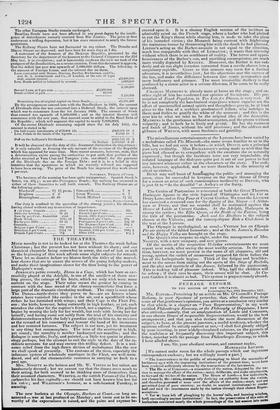THE THEATRES.
Mucri novelty is not to be looked for at the Theatres the week before Christmas ; but the present has not been without its share ; and our
theatrical chronicle being somewhat in arrear, the end of last as well as the beginning of this week affords some slight subjects for remark. These let us dismiss before we blazon forth the titles of the marvel- lous shows that are to amaze the senses of the young holyday-makers, and make their imaginations slaves for the time being to the power of Harlequin's wand.
JERROLD'S petite comedy, Doves in a Cage, which has been so suc- cessfully played at the Adelphi, is one of the smallest of those ster-
ling pieces, the coinage of his brain, which we only wish were more current on the stage. Their value seems the greater by coining in contrast with the base metal of the clumsy counterfeits that form a large part of the dramatic circulating medium. The story is S0011 told. The Doves—turtle-doves they prove to be—are an heiress whose estates have vanished like castles in the air, and a spendthrift whose
riches he has furnished with wings ; and their Cage is the Fleet Pri-
son : the birds, however, being outwardly in high feather, as yet, each mistakes the other for the captive's friend, riot a captive. The gallant
begins by wooing the lady for her wealth, but ends with loving her for herself; and having come out nobly from the trial of his sincerity and disinterestedness which the lady's guardian subjects him to, lie receives as the reward of his constancy and honour the hand of his inamorata
and her restored fortunes. The subject is not new, yet its treatment is any thing but commonplace. The tone of the sentiment is high, yet sound ; the morality is neither hackneyed nor maudlin ; and the dialogue is sensible, lively, and pointed,—a little too quaint in phrase- ology perhaps, but the attempt to suit the style to the date of the in.
cidents accounts for and may excuse this trifling defect. It is a wel- come relief from the high-flown diction of melodramas like the one we shall speak of presently. The customs of the time, especially the infamous system of wholesale marriages in the Fleet, are well intro- duced, and aid the characteristic costumes in carrying us back to a past age.
Mrs. NISBETT as the heiress and Mr. W. Visrixc as her suitor, arc handsomely dressed ; but we cannot say that the drama owes much to
their acting, for both seemed to be thinking more of themselves than their assumed characters. WEBSTER, as the sottish Parson of the Meet, carbuncles his face capitally—we should not have known him but for his voice ; and WiLsrsisoN's humour, as a soft-hearted Turnkey, is amusing.


























 Previous page
Previous page